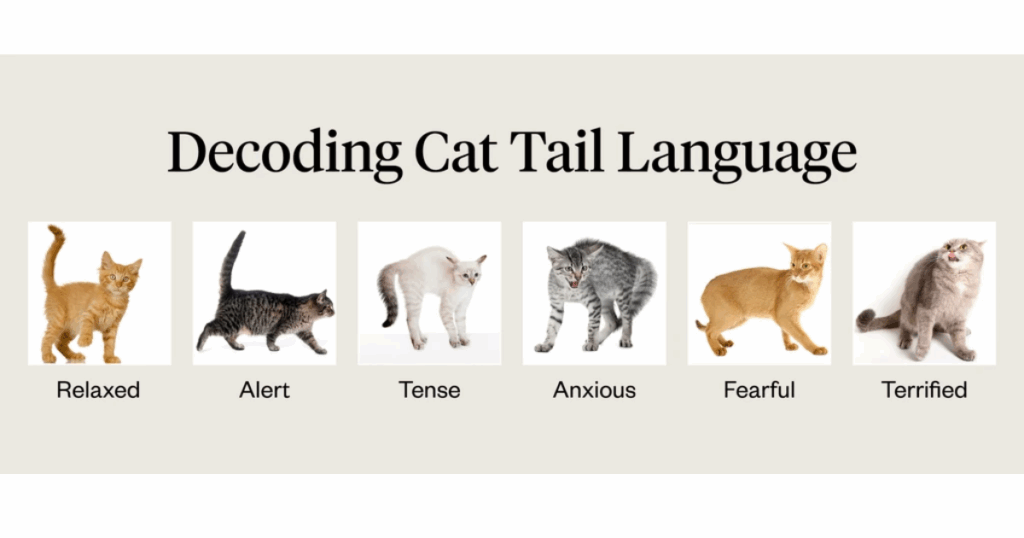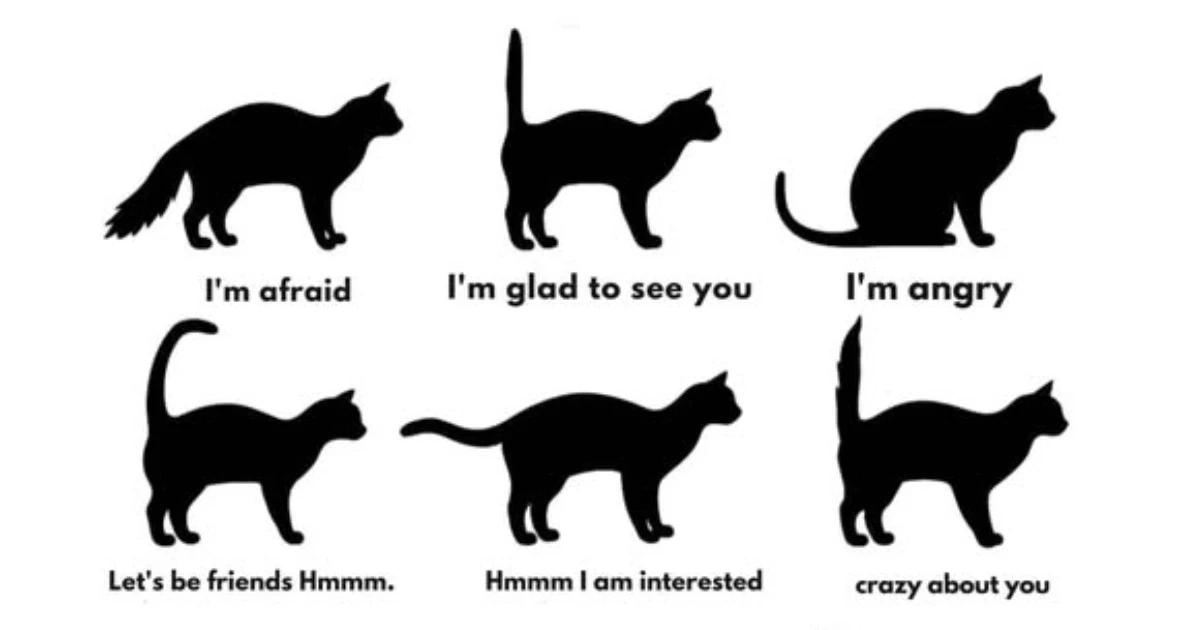Warm Introduction
Have you ever wondered why your cat’s tail suddenly twitches or wraps around you? That fluffy tip isn’t just decorative—it’s a little mood meter! Learning to read your cat’s tail can deepen your bond, prevent misunderstandings, and even help you spot signs of stress early on. For more insights into feline cues, check out Understanding Your Cat’s Behavior over at Secrets of the Green Garden—it dives into everything from ears to whiskers.
Outline & Word Counts
- Tail Language Basics – 200
- Common Tail Positions (+ Meanings) – 600
- Step‑by‑Step Tips for Reading Tail Signals – 300
- Common Mistakes & How to Avoid Them – 200
- Benefits of Understanding Tail Language – 200
- Seasonal & Regional Tail Clues – 150
- Tools & Materials Checklist – 100
- FAQs – 200
- Conclusion & Discussion Prompt – 100
1. Tail Language Basics
Cats use their tail like a social signal. Just as we smile or frown, they flick or fluff their tails to express confidence, curiosity, tension—or even love. Once you understand these signals, you’ll feel less guessing and more bonding.
LSI/NLP keywords: cat tail signals, feline body language, cat mood signals
2. Common Tail Positions & Meanings
- Tail straight up – Friendly greeting! A quivering tip signals excitement.
- Question-mark curve – Curious and seeking attention.
- Tail tucked low – Insecure or anxious—time to step back.
- Puffed up/halloween arch – Fearful or defensive; give them space.
- Fast whipping – Agitated or annoyed—don’t approach.
- Slow swishing – Calm but focused; often hunting mode.
- Twitchy tip – Mild irritation or intense focus.
- Wrapped around you – Trust and affection—perfect moment for a gentle pet.

3. Step‑by‑Step Tips for Reading Tail Cues
- Observe quietly—don’t crowd your cat when tail changes.
- Combine signals: ears, eyes, posture matter too.
- Context is key: a swish while stalking = different than when petting.
- React appropriately: give space when tails thump or arch.
- Reinforce positive signals: reward calm or affectionate tail positions.
4. Common Mistakes & How to Avoid Them
- Mistaking a twitch for friendliness—unlike dogs, cats twitch when annoyed.
- Ignoring other body cues like dilated pupils or flattened ears.
- Approaching a puffy tail—this often leads to swipes or hisses.
- Giving treats when your cat is tense; this reinforces stress.
5. Benefits of Understanding Tail Language
- Stronger bond—you’ll respond to their emotional needs more accurately.
- Safer interactions—avoid bites by recognizing warning signs.
- Tailored play—know when they’re in the mood vs. ready to retreat.
- Early illness detection—a tucked tail could mean more than fear—it could signal pain.
6. Seasonal & Regional Tail Clues
- Summer: hot cats may thump their tails when touched; they’re overstimulated.
- Winter: cautious cats keep tails close to stay warm outdoors.
- Outdoor cats in busy areas often hold tails low—offer safe indoor zones.
7. 🛠️ Tools & Materials Checklist
- 📸 A phone to snap tail positions
- 📓 A journal to note patterns
- 🧸 Toys for positive tail‑language rewards
- 🧘 Quiet space for your cat to feel safe
- 🩺 Vet contact info just in case
8. FAQs
Q: My cat’s tail is quivering—what now?
A: Usually a greeting—respond with gentle petting or a treat.
Q: What does a puffed tail mean?
A: It signals fear or threats. Ease off and lower stress around them.
Q: Tail twitch during petting—is that OK?
A: Yes, up to a point. If it turns into lashing, give them a break.
Q: Can tail indicators show illness?
A: Definitely. A tucked tail with no apparent fear might mean pain—get a vet check.
Q: Can I reward positive tail language?
A: Absolutely. Treats or soft strokes after a friendly tail signal help build trust.
9. Encouraging Conclusion
Cracking your cat’s tail code is like opening a secret door to their world 🐱. You’ll deepen your connection, avoid confusion, and enjoy knowing exactly how your feline friend feels. Seen a tail signal you didn’t expect? Share it below—I’d love to hear your furry story! And if you find this helpful, don’t forget to share it with fellow cat lovers.
Sources
Demander à ChatGPTOutils
ChatGPT peut faire des erreurs. Envisagez de vérif


cyf4hd
mep2lc
aaycr8
https://t.me/s/beEFCasINO_OfFICiAlS
Wenn Sie auf der Suche nach aufregenden Casino-Boni sind, bietet Wolfy Casino eine
Vielzahl von Aktionen, die Ihr Spielerlebnis verbessern sollen.
Dies ist eine gängige Praxis bei seriösen Online-Casinos und bietet eine Vertrauensbasis für die Benutzer.
Und wenn Sie noch mehr Möglichkeiten erkunden möchten,
vergessen Sie nicht, unsere anderen Casinotests zu lesen, um einen breiteren Überblick über das Angebot
in der Online-Glücksspielwelt zu erhalten. Wolfy Casino untersteht
der Gerichtsbarkeit von Curaçao, was eine regulierte und sichere Umgebung für Spieler gewährleistet.
Ihr habt alle bekannten Tisch- und Kartenspiele sowie die besten Spielshows
zur Auswahl.
Falls Sie unsicher sind, hilft Ihnen unser Support gern weiter.
Anschließend steht Ihnen unser Willkommensbonus zur Verfügung, sofern Sie
die Anforderungen erfüllen. Sollte es zu Verzögerungen kommen,
hilft unser Kundensupport gerne weiter. Berücksichtigen Sie bitte das Auszahlungslimit und stellen Sie sicher, dass Ihr Konto verifiziert ist.
Falls Unklarheiten bestehen, hilft unser Kundensupport
gerne weiter. Beispiele sind Ausweiskopien, Stromrechnungen oder Bankauszüge.
Diese Support-Funktionen tragen zu einem positiven Wolfy Casino
Erfahrungen, so dass es einfach für die Spieler, um alle Probleme zu lösen, die sie während des
Spiels bei Wolfy Casino. Dies ist zwingend erforderlich, um Ihr Konto zu
sichern und die Vorschriften einzuhalten. Der Mindesteinzahlungsbetrag beträgt bei den meisten Methoden 20 €, wobei die Höchstbeträge von 1.000 € für Astropay und Mifinity bis zu 5.000 € für Visa, Mastercard und Jeton reichen.
References:
https://online-spielhallen.de/umfassender-leitfaden-zum-cosmo-casino-cashback-und-mehr/
The platform automatically adapts to any screen size, ensuring
optimal performance whether players are using smartphones, tablets,
or desktop computers. Players earn points through regular gameplay, which can be redeemed for cashback,
exclusive bonuses, and special privileges. The live
blackjack and roulette tables are particularly popular,
offering multiple betting limits to accommodate both casual players and high rollers.
Designed specifically with Canadian players in mind, the platform supports CAD transactions alongside six major cryptocurrencies, making it accessible to both traditional and crypto-savvy players.
RocketPlay casino’s commitment to fast payouts is also a
huge, hugedraw for players. Seriously, forget about confusingcurrency conversions and those
pesky potential hidden fees that canmysteriously chip away at your hard-earned winnings;
at rocketplaycasino, all transactions – every single deposit, bet,
and payout – arehandled directly in CAD.
What truly sets rocketplay casino apart is its deep understanding of theCanadian market.
Canada has its own distinct flavour when it comes to
online gambling,and let’s be honest, we Canadians expect
an online casino that trulygets us. From the very first
moment youland on its sleek, modern interface, you’ll just feel that rocketplaycasino means business – the kind of business that delivers pure,unadulterated fun and gives you every possible chance to Play & Win RealMoney.
References:
https://blackcoin.co/play-free-slots-%f0%9f%8e%b0-browse-19430-online-slot-games/
casino avec paypal
References:
workompass.com
casino online paypal
References:
http://www.sunti-apairach.com/
https://t.me/s/portable_1WIN